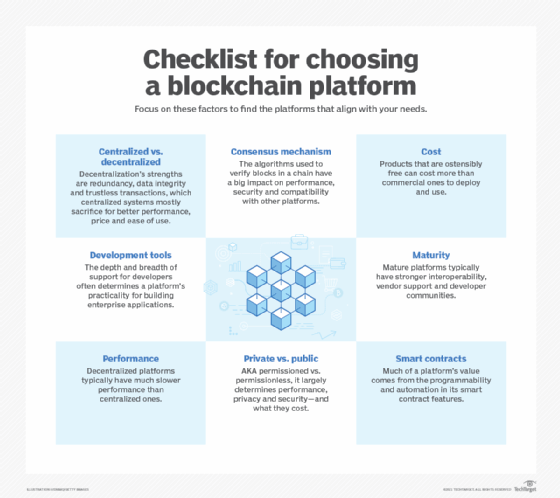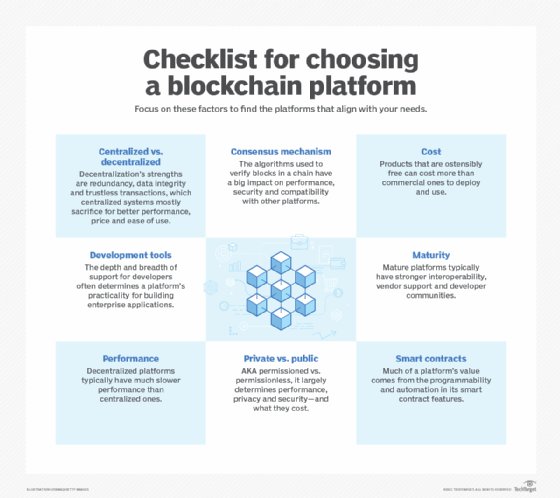Blockchain Platforms in the Enterprise: The Ultimate Guide
Interest in blockchain technology continues to surge as businesses explore ways to streamline operations, enhance supply chain visibility, and improve financial transactions. Modern blockchain platforms have evolved to overcome the limitations of early cryptocurrency platforms, such as Bitcoin, and offer practical value for various enterprise applications.
“Enterprises have begun to adopt these blockchain platforms for some of their application needs, most often in areas that require multiparty cooperation or data exchange,” explained Suseel Menon, practice director at Everest Group, an IT advisory firm. Menon highlighted blockchain applications in supply chain tracking, trade finance, digital assets, and identity management as moving beyond the pilot stage. There’s also some activity in using blockchain platforms for certain functions of ERP, such as vendor management and supply chain management (SCM).
Other analysts have noted increased demand for blockchain platforms originating from decentralized finance (DeFi), which enables new business models, posing a threat to traditional banking, finance, and supply chain finance.
Key Considerations When Choosing a Platform
There are many factors to assess when choosing a blockchain platform, including performance and cost.

Chris Georgen, board member and advisor at Apparatus (formerly Topl), which built a blockchain for sustainability, recommends evaluating these four aspects:
- Open vs. Closed Platforms: Whether a platform is public (open) or private (closed) affects its speed and security. Public blockchains are easier to set up but often slower.
- Consensus Mechanism: Popular mechanisms include Proof of Work (PoW), Proof of Stake (PoS), and Byzantine fault tolerance. PoW is the older mechanism used by Bitcoin, while PoS is more efficient.
- Ledger Technology: Different methods exist for recording transactions, such as the account model and Unspent Transaction Output (UTXO).
- Smart Contract Functions: These capture business logic on the blockchain, with popular programming languages including Solidity and WebAssembly.
Top Blockchain Platforms
Here’s an overview of several leading blockchain platforms:
1. Ethereum
Introduced in 2013, Ethereum is a well-established platform with strong support for smart contracts. It is considered to be a potential blockchain killer app. Ethereum’s primary currency is called Ether, and it has seen widespread adoption by those building decentralized applications (dApps).
Ethereum has a robust ecosystem of tools for writing smart contracts using the Solidity programming environment, which operates on the Ethereum Virtual Machine. Many observers anticipated changes after Ethereum transitioned from Proof of Work (PoW) to Proof of Stake (PoS) in 2022, making it more energy-efficient. The Ethereum Foundation estimated this reduces energy use by 99.95% compared to the older method.
“Ethereum has seen widespread adoption by technologists who build decentralized applications (dApps) that run on the Ethereum network,” commented Suseel Menon.
Ethereum also has an active developer community spearheaded by the Enterprise Ethereum Alliance, which includes members like Accenture, JPMorgan Chase, and Microsoft.
2. IBM Blockchain
IBM Blockchain is a private, decentralized network often integrated into enterprise cloud and legacy systems. The vendor claims significant progress in financial services, banking, and supply chains. Examples include IBM Food Trust, designed to ensure food safety and traceability, and IBM Blockchain Transparent Supply, which improves traceability in SCM, offering features for QA verification and improved forecasting.
3. Hyperledger Fabric
Hyperledger Fabric, supported by the Linux Foundation, is a set of tools designed for building blockchain applications with enterprise distributed ledger uses in mind. It has a modular architecture suitable for closed blockchain deployments and uses an open smart contract model supporting various data models. Hyperledger Fabric also improves data privacy and enables high-speed transactions. It is supported by leading cloud providers and has a robust community developing features related to consensus algorithms and privacy. Version 3.0 added support for Byzantine fault tolerance.
4. R3 Corda
There’s debate whether R3 Corda is a blockchain or a distributed ledger. It uses a novel consensus mechanism where transactions are cryptographically linked in real time, potentially improving performance. Corda is popular in the financial industry and supports automated business logic across company boundaries, including a delivery-versus-payment mechanism.
5. Tezos
Tezos, developed since 2014, supports dApps, smart contracts, and novel financial instruments, such as NFTs. The platform has a dynamically upgradable protocol and supports a PoS consensus mechanism. An on-chain upgrade mechanism enables developers to add new features without creating a new blockchain. The Tezos platform has been regularly updated with enhancements and has developed tools for weaving NFTs into enterprise supply chains.
6. EOSIO
The EOSIO blockchain platform, launched as an open-source project in 2018, is optimized for developing dApps and smart contracts. It uses a complex PoS consensus mechanism optimized for performance. It also has a governance feature for voting on platform changes. EOSIO provides tools for customizing blockchain implementations for decentralized use cases in SCM, healthcare, and DeFi. EOSIO-Taurus is designed for enterprise performance on private blockchains, with features to handle a larger volume of transactions more securely. A more recent hard fork saw the activation of a new consensus algorithm called Savanna, which significantly improved speed and scalability.
7. Stellar
Stellar is a blockchain platform optimized for DeFi applications. Stellar uses the Stellar Consensus Protocol, which helps speed up the processing of transactions. It has been adopted by several companies for international trade. Applications built on Stellar include MoneyGram and Circle.
8. Consensys Quorum
Quorum is a customized version of Ethereum developed by JPMorgan Chase, optimized for high-speed transactions between institutions on a private network. Consensys bought Quorum’s intellectual property in 2021 and integrated it, positioning it as a way for enterprises to accelerate the development of Ethereum-based applications. Consensys has an extensive ecosystem of tools and services to support Quorum, including private blockchain networks and developer tools.


